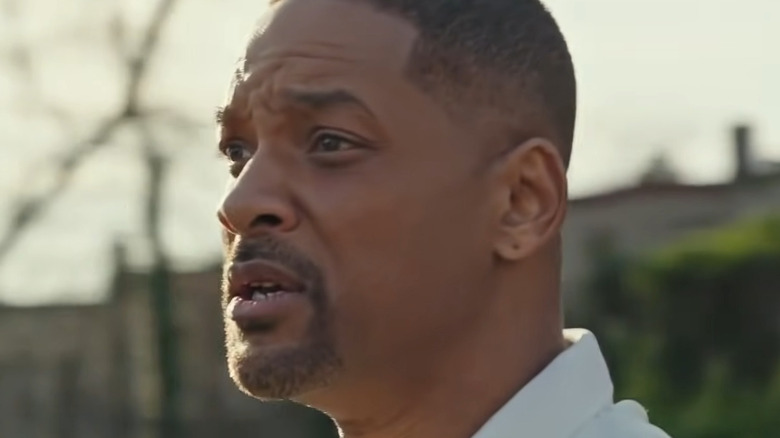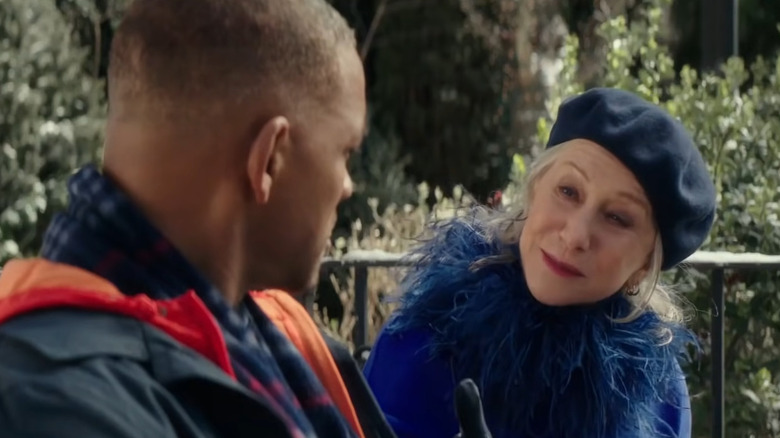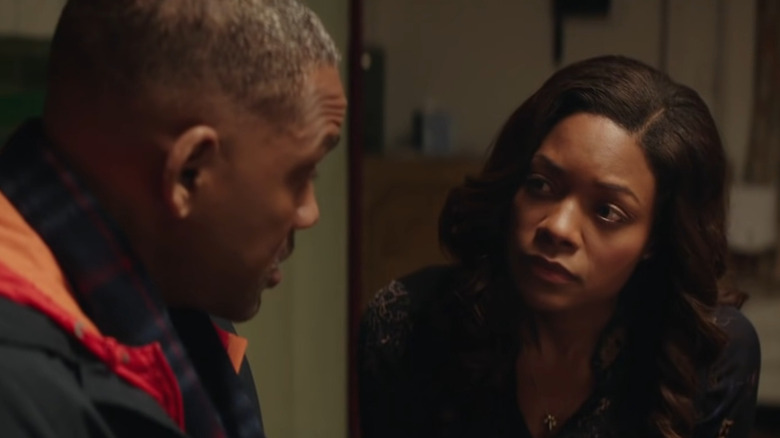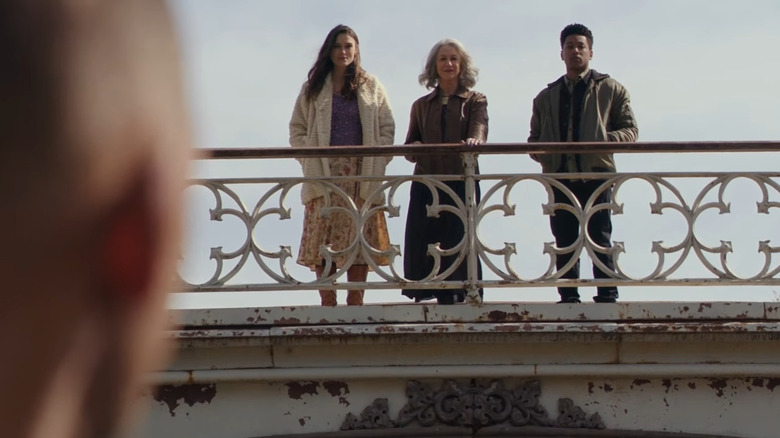The Ending Of Collateral Beauty Explained
"Collateral Beauty" is a strange case of a movie. Released in 2016, the film has a star-studded pool of Oscar-winning and nominated talent including Will Smith, Edward Norton, Kate Winslet, Michael Peña, Naomie Harris, Helen Mirren, and Keira Knightley. Similarly, the film's Oscar-winning director, David Frankel, has helmed such beloved films as "The Devil Wears Prada." So, with such an acclaimed cast and director, it might surprise viewers to learn of the reception that "Collateral Beauty" received.
There's quite a bit to the film's plot, but to put it simply, it tells the story of an ad executive who, after abandoning his company following the death of his daughter, questions the universe by writing letters to death, love, and time ... only to be surprised when they respond. While the film faired all right at the box office, earning nearly $90 million on a $36 million budget (via Box Office Mojo), it was annihilated by critics (via Rotten Tomatoes). Most reviews for the film were very harsh, calling out its premise as something that wants to be inspiring and sweet, but comes off as nonsensically unlikable, laughable, and corny.
Does the film deserve such a reputation? Well, that depends on how one sees its ending. The big plot twists that occur during its conclusion are amongst some of the film's most ridiculed aspects and can make or break the experience. So what's all the big hullabaloo all about? Let's break down "Collateral Beauty" and find out.
When actors play their roles too well
"We long for love, we wish we had more time, and we're afraid of death" — these lines by Will Smith's Howard early on in the film essentially spell out much of what we will see later on.
Following his daughter's passing, Howard spirals into an elongated depression, abandoning the company he helped build. This leaves many employees in a difficult place, including his friends Whit (Norton), Claire (Winslet), and Simon (Peña). When they discover that Howard is writing abstract letters to love, death, and time, they hire three actors (Keira Knightley, Jacob Lattimore, and Helen Mirren) to feed into Howard's reality by playing the three abstract ideas. The actors confront Howard, with their interactions filmed to later digitally erase the actors out. They show the higher-ups that Howard is not mentally fit to run the company, allowing them to sell it.
Howard is not the only one facing problems. Whit has a tarnished relationship with his daughter, Claire fears she is running out time to have a child, and Simon is battling cancer. They coincidentally pair with the actor that represents their condition, all of whom give meaningful advice and help. Having these ideas represented as actors adds an extra layer of ambiguity to the film's events. Sure, we can assume that they are all simply caring people who want to help out our protagonists. Or are they something greater? Possibly an ode to similar holiday movies as "It's a Wonderful Life," which director David Frankel mentions in an interview with Scannain as influences, it's quite possible that they are meant to be illusions that only the four protagonists can see. Each one feeds into the dilemmas of Howard's three friends, while Howard needs to face all three.
Perfect strangers
One of the most important aspects to "Collateral Beauty," and its biggest twist, comes in Howard's relationship with Madeline (Naomie Harris, aka Eve Moneypenny). The two meet when Howard chooses to attend a support group she runs for people who have lost their children. Howard is silent, so traumatized that he can't even say his daughter's name. Madeline allows him to sit in at meetings without saying anything. They get to know one another as Madeline tells Howard of her own lost child, Olivia. Her husband left afterwards, with the two seeing themselves as strangers.
On Christmas Eve, Howard visits Madeline's house. She tries to get Howard to open up about his child, which he still struggles to do. That is until they turn on the TV to reveal a video of Howard playing with Olivia, revealing that he was the father the entire time. In his sunken grief, he has forgotten about Madeline.
When asked by Critical Hit as to what it was like playing as Madeline, Harris said, "What I love about Madeline is that she has discovered, through her own loss, a way to find meaning in life, which is by helping other people deal with their loss [...] because as she says in the movie: 'You never get over something like that. It always stays with you.' But Madeline has found meaning in helping people navigate that journey."
In rediscovering Madeline, Howard faces a mirror image of an individual who shares his exact same experience. The only difference is that she has turned her grief around to not only help others, but help herself. As a result, Madeline provides the final piece of his journey to take the steps to move past Olivia's loss.
Finding the collateral beauty
Another layer is added to the film when Madeline talks of the time when Olivia died in the hospital. While in the waiting room, she meets a mysterious woman who tells her to make sure she notices the "collateral beauty."
We later learn that the woman was Brigette, who was playing as Death in Whit's plan. This, once again, seems to confirm that the actor characters are more than what they seem. More importantly, we start hearing of the concept of collateral beauty. When asked by Scannain as to what it means, director David Frankel states, "Collateral beauty are those moments that make life worth living. The things that we sometimes take for granted, that we don't notice all the time ... they are the reason that we live and love."
The very end of the film sees Howard and Madeline taking a walk in the park. They pass under a bridge and Howard turns back at one point, where he sees the three actors from earlier looking down at him. When Madeline turns and looks, there is nothing there for either to see and they walk off. Howard's crossing under the bridge acts as a metaphor for his new lease on life. He can finally leave the painful mindset from the past behind, and he no longer needs to question the universe. Love, death, and time no longer take over his mind and he can move forward in moving past his pain. Through Madeline and his own self-will, Howard has finally found his collateral beauty.



